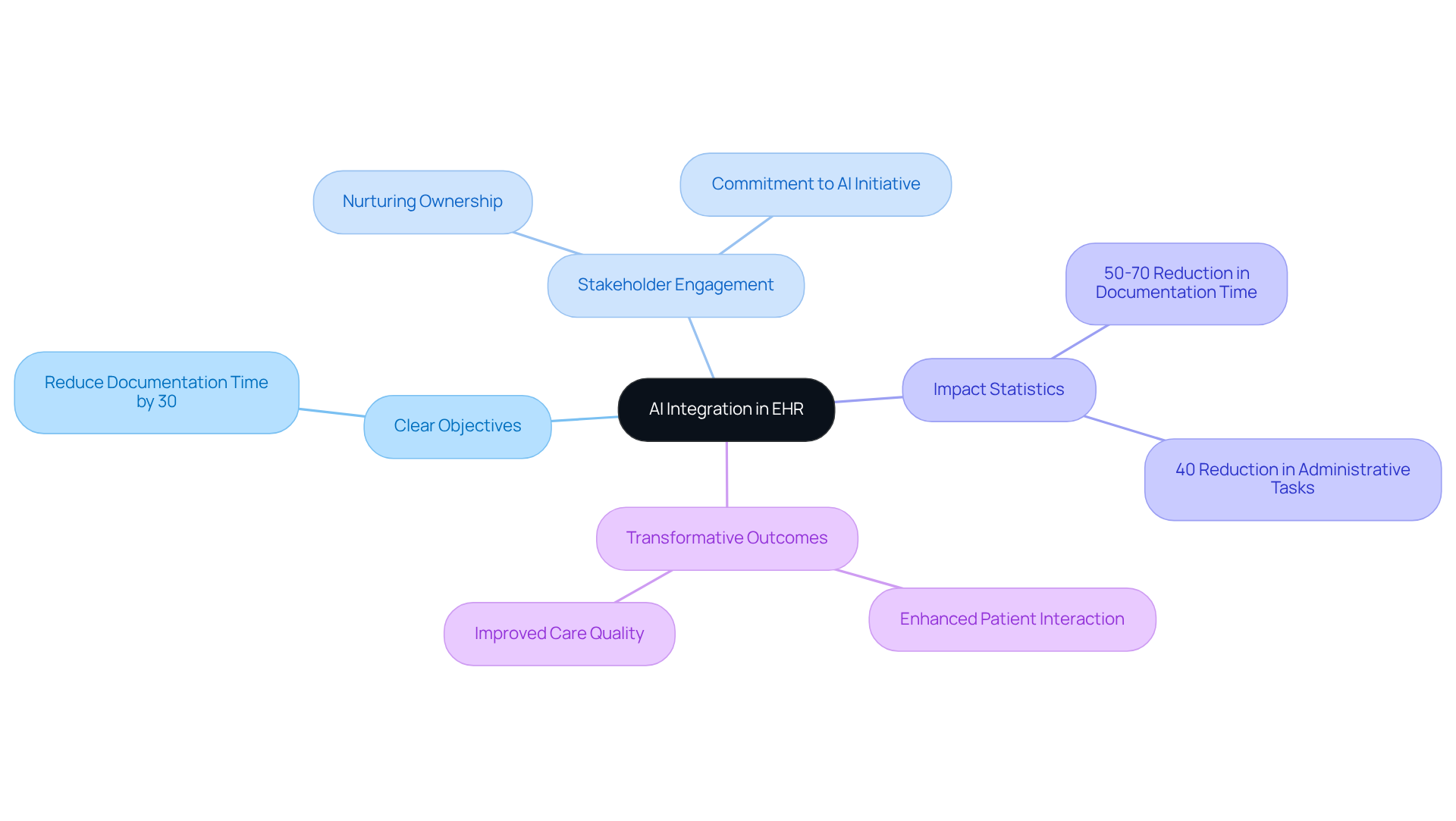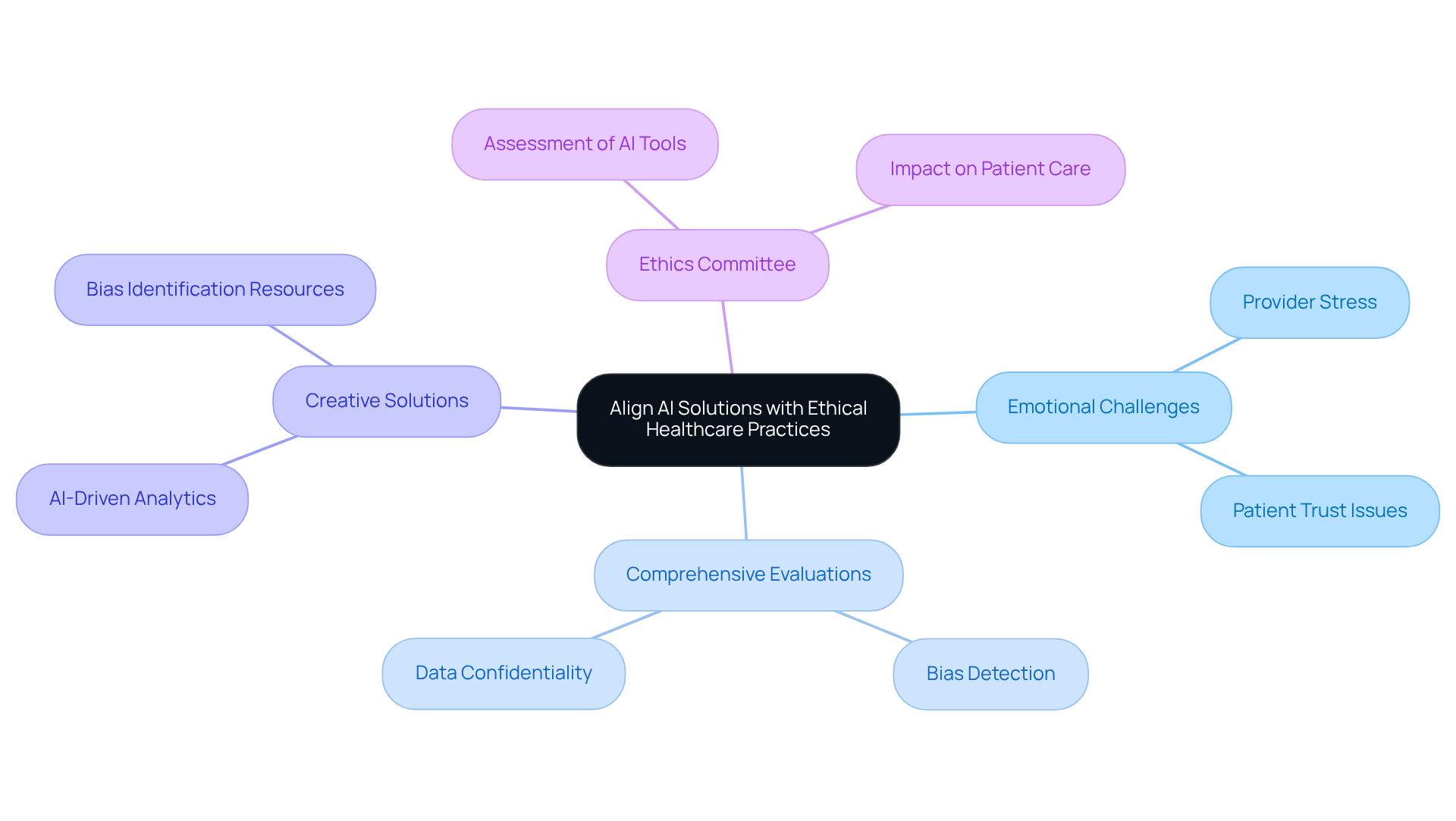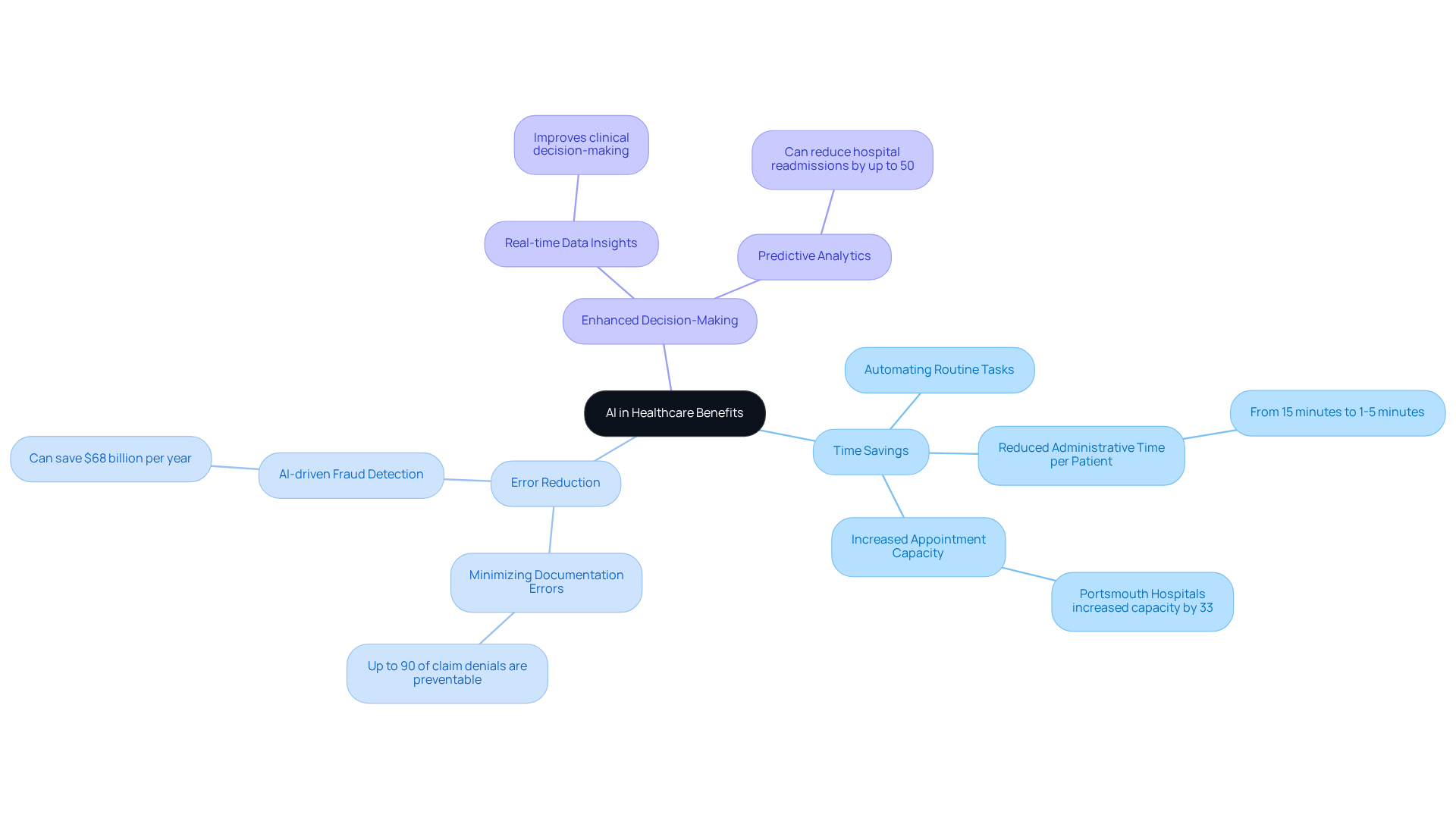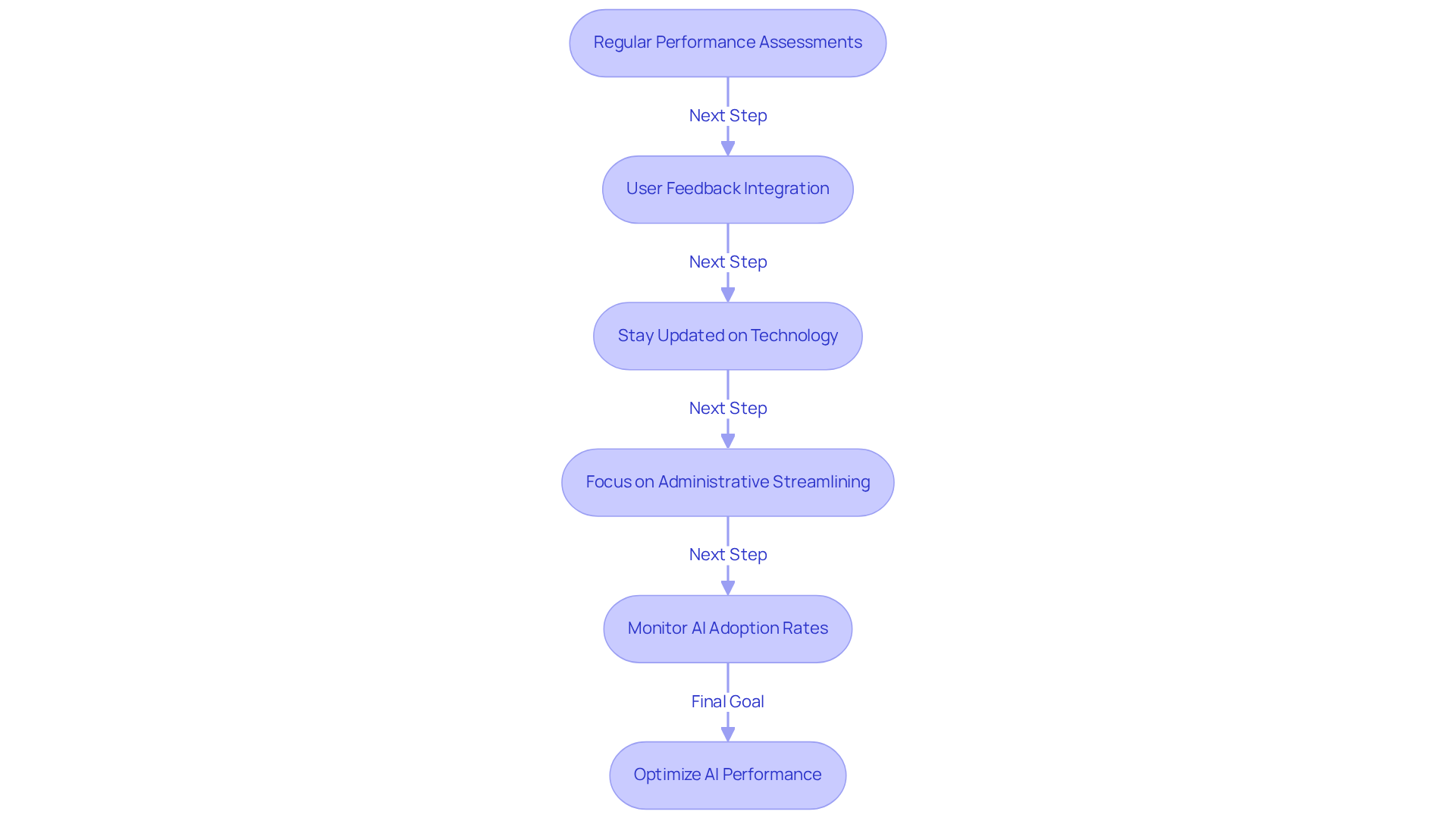Overview
In the demanding world of healthcare, many providers face emotional challenges that can impact their ability to deliver the best patient care. The administrative burdens they carry often weigh heavily, detracting from precious time spent with patients. Understanding these struggles is crucial.
To address these concerns, the article outlines five compassionate strategies for implementing AI in electronic health records (EHR). These strategies not only aim to enhance operational efficiency but also focus on improving patient care. Here are the key solutions:
- Establish clear objectives for AI implementation.
- Align AI initiatives with ethical practices.
- Leverage AI for administrative tasks to reduce workload.
- Continuously evaluate AI tools for effectiveness.
- Engage stakeholders to ensure collaborative efforts.
These approaches are supported by evidence demonstrating significant time savings, reduced errors, and improved clinician decision-making. By adopting these strategies, healthcare providers can experience a more manageable workload and ultimately enhance the quality of care they offer.
It's time to reflect on how these strategies can be integrated into your practice. Together, we can foster a more efficient and compassionate healthcare environment.
Introduction
The integration of artificial intelligence (AI) into electronic health records (EHR) marks a significant transformation in healthcare. This shift holds the promise of easing administrative burdens, allowing healthcare providers to focus more on what truly matters: patient care. By setting clear objectives and aligning AI solutions with ethical practices, providers can unlock remarkable benefits, such as reduced documentation time and enhanced decision-making processes.
Yet, this journey is not without its challenges. The delicate balance between technology and compassionate care raises important questions. How can healthcare organizations navigate these complexities effectively? It is essential to ensure that AI becomes a true ally in the pursuit of quality patient outcomes.
As we explore this topic, let’s reflect on the emotional challenges healthcare providers face daily. The weight of administrative tasks can overshadow the core mission of delivering compassionate care. Together, we can find ways to harness AI’s potential, transforming healthcare for the better.
Establish Clear Objectives for AI Integration in EHR
The integration of AI in EHR can feel overwhelming for medical providers, especially when considering the emotional toll of administrative burdens. To alleviate these concerns, it’s vital to establish clear, that resonate with the mission of improving care quality. For example, a medical organization might aim to reduce documentation time by 30% within the first year of implementing AI. This clarity not only aids in tracking progress but also fosters unity among team members in their shared efforts.
Engaging stakeholders throughout this process is crucial, as it nurtures a sense of ownership and commitment to the AI initiative. This involvement is essential for achieving positive outcomes. Medical leaders emphasize that defining measurable objectives is key to evaluating the impact of AI in EHR on both operational efficiency and client satisfaction. Statistics reveal that AI documentation resources can cut physician documentation time by 50-70%, showcasing the advantages of setting clear objectives.
By leveraging generative AI to tackle administrative challenges, healthcare providers can focus on delivering individualized care, ultimately enhancing access and experiences for patients. Consider the inspiring case of a medical organization that successfully implemented AI in EHR, which led to a remarkable 40% reduction in administrative tasks. This allowed physicians to dedicate more time to patient interactions, highlighting the transformative potential of AI in EHR to address the challenges faced in medical service provision.
As we reflect on these possibilities, it’s clear that embracing AI is not just about technology; it’s about improving the human experience in healthcare. Let’s take the next step together, exploring how these innovations can support our commitment to compassionate care.

Align AI Solutions with Ethical Healthcare Practices
Healthcare providers often face emotional challenges when navigating the complexities of integrating AI in EHR systems. It’s vital that these solutions adhere to ethical healthcare practices, as this directly impacts the quality of care provided. At CosmaNeura, we understand the significance of comprehensive evaluations of AI algorithms. These evaluations help detect potential biases and maintain data confidentiality, allowing providers to focus on what truly matters—their patients.
Our creative solutions, including AI-driven analytics and bias identification resources, are designed to enhance the quality of service while upholding ethical standards. Imagine how much more effective your team could be with tools that not only streamline processes but also foster trust among patients and staff. Organizations can take proactive steps by creating an ethics committee to assess AI tools and their effects on healthcare, ensuring that these technologies serve as allies in patient care.
By emphasizing ethical factors and utilizing AI in EHR through CosmaNeura's advanced capabilities, providers can build confidence in their systems. This assurance is crucial for ensuring that rather than undermines the quality of service offered. Let’s work together to ensure that technology serves as a partner in delivering compassionate care. How can we support you in this journey?

Leverage AI for Administrative Efficiency and Enhanced Patient Care
AI in EHR is transforming administrative efficiency by automating essential tasks such as client intake, billing, and appointment scheduling. This automation allows healthcare professionals to reclaim valuable time, which can be redirected towards supporting their clients. For instance, AI-driven tools can analyze client data to suggest precise billing codes, enhancing revenue cycles and reducing errors. Furthermore, AI enriches healthcare by providing clinicians with real-time insights during consultations, enabling informed decision-making and personalized treatment plans. This dual focus on operational efficiency and improved patient experiences underscores the profound impact of AI in EHR within medical services.
However, medical startups face unique challenges in implementing these AI solutions, particularly due to concerns from physicians regarding the quality of care. To alleviate these worries, it is crucial to , rather than replace, medical professionals.
Key benefits of AI in healthcare include:
- Time Savings: Automating routine tasks allows providers to devote more attention to patient interactions.
- Error Reduction: AI tools can significantly minimize documentation errors, which contribute to a large percentage of claim denials.
- Enhanced Decision-Making: Real-time data insights empower clinicians to make informed choices about patient care.
As Dr. Neesheet Parikh wisely states, "Embracing AI for medical administration is not about replacing staff, but empowering them." By implementing agentic AI solutions that enhance administrative efficiency and lessen provider burdens, medical organizations can help alleviate physician burnout and foster a culture of innovation. Projections suggest that AI could help reduce global medical expenses by over $400 billion annually by 2030, highlighting its transformative potential in service delivery.

Continuously Evaluate and Adapt AI Tools for Optimal Performance
To fully harness the potential of AI in EHR, healthcare organizations must create a supportive framework for the continuous assessment and adjustment of AI resources. This involves regularly evaluating the performance of AI algorithms, seeking user feedback, and staying informed about technological advancements. For instance, implementing a quarterly evaluation process can reveal areas needing improvement, ensuring that AI resources effectively support both individuals and providers. This proactive approach nurtures a culture of continuous improvement and aligns AI initiatives with best practices in patient care.
Strategies for Implementing AI in EHR:
- Regular Performance Assessments: Conduct quarterly reviews of AI algorithms to identify areas for improvement.
- User Feedback Integration: Actively seek to enhance AI resources.
- Stay Updated on Technology: Keep abreast of advancements in AI technology to ensure tools remain effective.
- Focus on Administrative Streamlining: Utilize generative AI to automate tasks such as appointment scheduling and documentation, allowing more time for meaningful interactions with clients.
- Monitor AI Adoption Rates: Track the increase in AI adoption among physicians, which rose from 38% in 2023 to 66% in 2024, to gauge effectiveness.
As illustrated by the significant increase in AI adoption among physicians—from 38% in 2023 to 66% in 2024—healthcare organizations are increasingly recognizing the value of AI in EHR for enhancing operational efficiency and patient outcomes. Additionally, 61% of hospitals utilizing predictive models reported conducting local evaluations for accuracy, highlighting the importance of thorough assessment in optimizing AI performance. Hospitals also report an impressive ROI of $3.20 for every $1 spent on AI, showcasing the financial benefits of integration. By prioritizing these strategies and addressing challenges, such as the need for increased oversight—ranked as the top regulatory action by 47% of physicians—organizations can ensure their AI technologies deliver maximum value and improve the quality of care.

Conclusion
The integration of AI into Electronic Health Records (EHR) marks a pivotal moment for healthcare providers, highlighting the emotional challenges they face in delivering compassionate care amidst administrative burdens. How can we ensure that technology serves to enhance, rather than detract from, the human experience in healthcare?
By establishing clear objectives and aligning AI solutions with ethical practices, healthcare organizations can harness the transformative potential of AI. This approach not only enhances administrative efficiency but also prioritizes patient care. Engaging stakeholders creates a sense of ownership, while utilizing AI to automate routine tasks allows providers to dedicate more time to meaningful patient interactions.
Ethical considerations are paramount; they guarantee that AI tools enhance the quality of care. Continuous evaluation of AI performance is essential for adapting to emerging challenges and maximizing benefits. This proactive stance is crucial in navigating the complexities of this rapidly evolving field.
Ultimately, the successful implementation of AI in EHR transcends mere technology adoption. It embodies a commitment to a vision of healthcare that emphasizes compassionate care and operational excellence. As we embark on this journey, embracing these strategies will not only improve efficiencies but also deepen connections with patients, leading to better health outcomes.
The call to action is clear: let us invest in the future of healthcare by integrating AI thoughtfully and ethically. Every step we take should enhance the patient experience, ensuring that compassion remains at the heart of care delivery.




